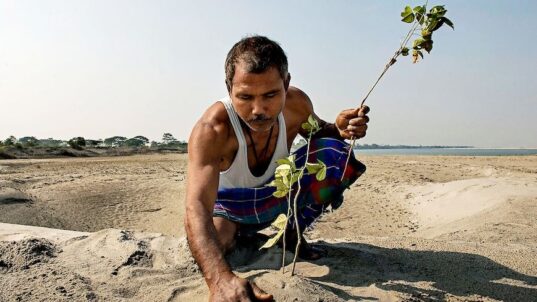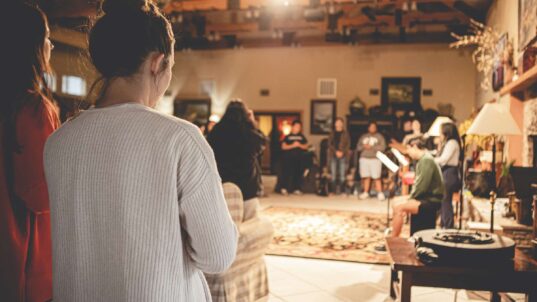
Exploring the role of information in a healthy democracy
What role does information play in democratic society? What questions and concerns do we face about information in our democracy? For the second community conversation in our four-part “Toward a More Perfect Union” series, we explored these questions. You can find a summary of the key points of the discussion below. We started with a review of some of the many ways that people might get the information they need to be a participant in a democracy. We then moved on to the big questions and concerns about information in our democracy.
In our upcoming third session on February 17 (4 pm-5:15 pm ET) we’ll step back and explore more about what we think “democracy” is–and what it isn’t. We started our series by exploring what it might mean to be a democratic citizen. In our third session, we want to explore other possible dimensions of being a healthy democracy. What might we have overlooked so far? When it comes to being a healthy self-governing society, what are other questions and concerns that we might face? We hope you’ll join us by registering here.
What are some of the ways for citizens to get the information they need for democracy to thrive?
- News media
- Newspapers and news magazines—from local to major national ones
- Commercial TV and radio outlets, major broadcast channels, local news, cable news (the latter often with more focus on opinion than reporting)
- Public broadcasting and public radio
- Foreign news outlets (to get a different perspective on our issues)
- News aggregating apps and websites (often provide a spectrum of views and sources)
- Podcasts—often connected to journalistic outlets
- Social media apps
- An array of news organizations and journalists can be found on Twitter and Facebook
- Information shared by friends and others in our social media circles
- Scholarship, research, science
- Government
- Direct communication of information from the government (press briefings, reports, hearings, newsletters from legislative committees, etc.)
- Our social networks
- Our social circles, family, friends, neighbors, trusted contacts, discussion groups
- Community leaders and authority figures (e.g. faith leaders, politicians)
What are different questions and concerns we face about information and democracy?
- How can we address concerns about citizens’ access to sufficient and accurate information to make democratic choices?
- The impact of information in a democracy depends on its truth-value
- Citizens need to make choices in a democracy (e.g. voting), and if they lack information or have bad information, they’ll make bad choices
- Where can people get objective information or news?
- Transparency is required: vetting and testing of sources in an open procedure to establish the accuracy of the information
- Develop trusted institutions and sources that establish a reputation for accuracy and transparency
- Anonymous communication of information leads to more low-quality information
- How can people learn what they might be missing in terms of relevant information, topics, or perspectives?
- Who has the responsibility for assessing the quality of information?
- Every citizen has a duty to inform themselves and to learn to practice good critical information skills (learn how to spot misinformation and not to pass it along)
- Experts have a responsibility for vetting specialized information (e.g. researchers, scholars, scientists)
- Institutions or organizations (news organizations, universities, etc.) have a responsibility for vetting sources and using transparent procedures to test the accuracy of information they distribute
- What if we establish trusted channels for communicating accurate information?
- What responsibilities do corporations have for communicating truthful information—and how might this be enforced?
- Government has a responsibility for the quality of information it puts out—and government could set standards for accurate information in general
- What if government monitored the flow of information, flagged misinformation, and pointed to where people could go to check the veracity of information?
- What if the government punished those who knowingly publish false information that leads to harms for other people?
- How should we balance concerns for the truthfulness of information with concerns for freedom of speech and of the press?
- What limits should there be for free speech in a democracy—and how might these limits be enforced, and by whom?
- There’s a growing concern that social media platforms have too much power to restrict free speech
- How should we manage the spreading of information that incites harm—and how might we decide what information is likely to incite harms?
- What if we take a hands-off approach for government, and allow an open forum where any information, no matter how wrong, can be published?
- What if we required journalists, or politicians etc., to be truthful? What could this look like?
- How do we preserve the critical role of dissident perspectives, especially those who speak truth to power?
- How can we manage the surplus of information and of information channels—when quantity overwhelms quality controls?
- How might we address the need for better civic education, to include critical information and media literacy skills?
- This is needed for all democratic citizens at all ages
- People need to learn how to evaluate information and sources, to differentiate between fact and opinion, and to sort out what’s truly relevant
- How can we address the bottleneck where people face attention overload, giving them little time for critically evaluating information?
- People need to learn how to engage each other productively with give and take, with patience for people changing their minds, and openness for different opinions
- How should we address problems within the educational system where it fails to provide such skills or where it continues to misinform students (e.g. correcting history of Blacks, women, indigenous peoples, etc.)?
- How can we develop critical literacy skills about the technology and platforms we use for information?
- How can we develop the patience for learning, where people adjust their understanding as new and better information becomes available?
- People need special skills when there is a crisis—where the first wave of information can often prove to be wrong
- How can we change the economic incentives so that conveying truthful and useful information is more economically valuable than conveying sensationalist or false information?
- There’s an incentive to actively mis- or disinform people because it is a way to keep them engaged on the platform and emotionally invested
- Commercial interests distort the information citizens receive, and this effect is magnified by the consolidation of information media and tech platforms
- How should we address concerns that financial interests are distorting the information space needed for a healthy democracy?
- How should we address concerns about the algorithms that social media platforms use to tailor the information people see?
- Given the impact these algorithms can have on our democracy (e.g. by distorting the information citizens see), how should they be regulated?
- Who should own or control the data that people generate by using social media or other technologies?
- What if people owned or controlled their own data?
- How can we change the incentives for authority figures or leaders around truthful information?
- Group leaders often play a powerful role in informing group members
- Group leaders can use disinformation to affirm group identity, to polarize group members against outsiders and outside information, and to stoke allegiance to the leader
- What can we do about the effects of mis- and disinformation?
- Bad information undermines democracy (e.g. leading to miscast votes) and undermines our freedom (people can’t think “freely” without knowing what is really going on)
- Disinformation further polarizes and divides us, fostering distrust, creating an “us vs. them” or “me against the world” mentality
- Disinformation typically has a target (a group, an individual) and seeks to polarize and mobilize people against the target (often a minority group)
- Disinformation takes on a life of its own as it is shared
- The abundance of disinformation can lead people to give up the search for truth, leading to more disengagement and cynicism about democracy
- How might we deal with the effects of conspiracy theories, which are resistant to facts or disproving?
- How can we deal with the effects of social and political polarization around information sources—or around the notion of “truth” itself?
- How do we break people out of their “bubbles” or information silos?
- What if we enabled more face-to-face experiences to humanize one another?
- How can we address a situation where a group polarizes against truth or against reputable information sources and processes (e.g. anti-science)?



